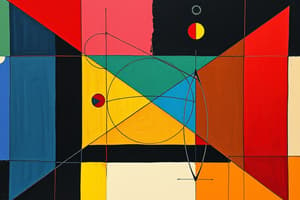Podcast
Questions and Answers
What do pronouns like 'he' and 'she' do in a sentence?
What do pronouns like 'he' and 'she' do in a sentence?
- List verbs
- Directly name nouns
- Describe adjectives
- Refer to nouns (correct)
In the sentence, 'John likes to eat pizza, and he also likes to drink soda,' what does 'he' refer to?
In the sentence, 'John likes to eat pizza, and he also likes to drink soda,' what does 'he' refer to?
- 'Pizza'
- 'Eat'
- 'John' (correct)
- 'Soda'
How are variables in mathematics similar to pronouns in language?
How are variables in mathematics similar to pronouns in language?
- They make equations more concise (correct)
- They refer directly to numbers
- They replace adverbs
- They are used to confuse readers
What is the role of pronouns in making sentences clearer?
What is the role of pronouns in making sentences clearer?
In set theory, what do quantifiers like 'all' and 'some' do?
In set theory, what do quantifiers like 'all' and 'some' do?
Why do variables play a crucial role in mathematics?
Why do variables play a crucial role in mathematics?
In propositional calculus, what are 'p' and 'q' used to represent?
In propositional calculus, what are 'p' and 'q' used to represent?
What do 'p' and 'q' stand for in the propositional calculus argument provided?
What do 'p' and 'q' stand for in the propositional calculus argument provided?
What is the function of the pronoun 'it' in the propositional calculus context?
What is the function of the pronoun 'it' in the propositional calculus context?
How are pronouns utilized in propositional calculus?
How are pronouns utilized in propositional calculus?
What is the role of variables like 'p' and 'q' in propositional calculus?
What is the role of variables like 'p' and 'q' in propositional calculus?
How do pronouns contribute to the language of mathematics and human communication?
How do pronouns contribute to the language of mathematics and human communication?
Flashcards are hidden until you start studying
Study Notes
Math and Pronouns: Unraveling a Surprising Connection
As you might expect, the world of mathematics is filled with numbers, equations, and proofs, but did you know that it also has a hidden language connection? In this article, we'll explore the intriguing overlap between math and the use of pronouns, a fundamental aspect of human language.
Pronoun Basics
Pronouns are words like "he," "she," "it," and "they" that refer to nouns without directly naming them. They serve as stand-ins for nouns to make sentences clearer and more concise. Let's consider a simple example:
"John likes to eat pizza, and he also likes to drink soda."
Here, "he" is a pronoun that refers back to "John."
Pronouns and Variables in Mathematics
Ever wonder why you use variables in algebra? Variables serve a similar purpose to pronouns in language. They are stand-ins for numbers or values in mathematical expressions. For instance, consider the following equation:
[x + 3 = 7]
Here, "x" is a variable that could represent any number, such as 4 or 11, that satisfies the equation. Just like pronouns in language, variables help make equations more concise and generalizable.
Pronouns and Quantifiers in Set Theory
Set theory, a branch of mathematics, uses language to describe and manipulate sets of objects. Pronouns and quantifiers play a crucial role in set theory's language. Quantifiers are words like "all," "some," and "many," which specify how many elements in a set satisfy a certain property.
For example, let's consider the set of humans who can fly:
[{x \mid x \text{ is a human and } x \text{ can fly}}]
The quantifier "some" could be used to describe a non-empty subset of this set, such as:
[{Superman} = {x \mid x \text{ is a human and } x \text{ can fly and } x \text{ is a fictional character}}]
In this case, "Superman" is a single representative of the set.
Pronouns and Logic in Propositional Calculus
Propositional calculus, another branch of mathematics, deals with the logic of propositions, or statements that can be either true or false. Pronouns also appear in propositional calculus's language, such as in arguments or proofs involving conditionals (if-then statements).
For example, consider the following argument:
[ \begin{array}{ccc}
- & p & \text{(assumption)} \
- & p \rightarrow q & \text{(assumption)} \
- & q & \text{(from 1 and 2 by modus ponens)} \
- & \text{If } p \text{, then } q, \text{ and } q & \text{(from 2 and 3)} \ \end{array} ]
Here, "p" and "q" are placeholders (variables) representing any two propositions ("John is tall" and "John has a hat," for instance), and the pronoun "it" in "If p, then q, and q" summarizes the two propositions.
Conclusion
As we've seen, there are intriguing connections between the language of mathematics and the language of human communication. Pronouns, variables, and other language elements play important roles in both. Whether you're studying algebra, set theory, or propositional calculus, it's fascinating to recognize the crossover between mathematics and language, and to realize that the skills you've learned in one subject can often enrich your understanding of the other.
Studying That Suits You
Use AI to generate personalized quizzes and flashcards to suit your learning preferences.




